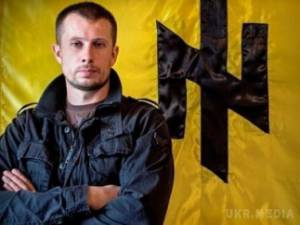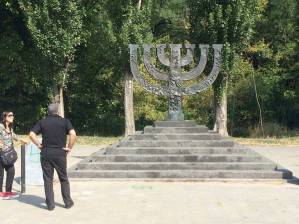Anti-Semitism is no vote-winner even for Ukraine’s far-right
 Andriy Biletsky, MP and commander of the Azov volunteer battalion
Andriy Biletsky, MP and commander of the Azov volunteer battalion
Even the most notorious neo-Nazi in Ukraine’s parliament recently denied having previously made white supremacist and anti-Semitic utterances – among the reasons why Viacheslav Likhachev, head of the National Minority Rights Monitoring Group and leading researcher in the field, expresses ‘cautious optimism’ about the situation with anti-Semitism and xenophobia in Ukraine.
It is not easy to write about anti-Semitism in Ukraine at present. The very subject is likely to be met with antagonism, even suspicion that the person speaking is in the pay of the Kremlin. The latter has certainly expended huge amounts of effort and money trying to push the line that first Euromaidan and the government that followed were made up of rabid anti-Semitic hordes. The allegations have been rightly knocked down by authoritative experts and Jewish leaders.
In an important interview for the newspaper Hadashot, Likhachev says that one can understand the tendency to assume that anti-Semitism or any negative phenomena are provocation from the Kremlin, or to minimize their importance at a time when the country is at war, with thousands killed or forced from their homes.
He warns, however, that such an attitude from the authorities must be considered “unacceptable negligence”. The state has certain obligations, and these cannot be categorized as more or less important. Indeed, hate crimes are rightly considered to pose a danger to society and must be properly investigated with the culprits arrested and punished.
Here, unfortunately, Ukraine’s authorities have never dazzled, and there is no sign of improvement. Nor is Likhachev alone in expressing criticism and frustration.
 Babi Yar after one of the vandalism attacks
Babi Yar after one of the vandalism attacks
As reported, there have been six cases of anti-Semitic vandalism this year to the Menorah at Babi Yar in Kyiv where in 1941 the Nazis murdered over 33 thousand Ukrainian Jews. The latest attack during the night of Sept 13, on the eve of Rosh Hashanah, the Jewish New Year, was particularly serious and elicited a public call to action from a number of Ukraine’s Jewish leaders. They expressed frustration that the authorities and law enforcement bodies have still taken no effective measures to stop attacks on a monument of importance to each Kyiv resident which honours the victims of one of the worst massacres of the Second World War. They point out that the police have several times initiated criminal investigations only to then terminate them for supposed lack of elements of a crime.
Such inaction, they say, is especially disgraceful given the obvious propaganda uses likely to be made of any anti-Semitic attack on the Babi Yar Memorial.
“Ukraine’s Jewish community demands an immediate, thorough and comprehensive investigation of these crimes and asks the Prosecutor General’s Office to take the course of this investigation under its control.
It also seems sensible to install video surveillance or police patrols in the area around the Menorah to prevent a repetition of such vandalism, whoever the culprits are – provocateurs, hooligans or convinced anti-Semites.”
Likhachev points out that neither this year, nor in 2014, was even one of the vandals who desecrated graves, memorials to the Victims of the Holocaust or other monuments found and punished.
The police may be stretched, the country at war, but installing CCTV cameras is surely not impossible.
Likhachev also stresses that given the information front which is part of the hybrid war being waged against Ukraine, the fact that anti-Semites are enjoying effective impunity is of “serious public importance”.
He is polite but unimpressed by the reports this last January that Ukraine’s Foreign Ministry was about to create the post of Special Representative on Countering Anti-Semitism and Xenophobia. Nothing appears to have come of that plan, but such posts have been established earlier.
“One solved anti-Semitic crime would be far more effective at demonstrating the state’s attention to the problem than the establishments of Special Representative posts even in five different departments”, Likhachev suggests.
On the other hand, he notes, in a more recent blog, that Ukraine’s President Petro Poroshenko made a point, unlike his Russian counterpart, Vladimir Putin, of meeting with American Jewish organizations while in New York this week. Prime Minister Arseny Yatsenyuk has also written to the head of the World Jewish Congress assuring him that the recent cases of anti-Semitic vandalism at Babi Yar will be properly investigated. All this, Likhachev notes, is part of a consistent dialogue which Ukraine’s leaders have developed.
General trends in post-Maidan Ukraine
The interviewer, Mikhail Gold notes that there have been statements from certain members of far-right parties, including Right Sector hearkening back to what he calls “the traditional quasi-anti-Semitic rhetoric that they rejected after Maidan”.
Likhachev says that these are for the moment individual incidents which cannot be said to form a climate in society. He points out that public opinion surveys suggest an improvement in the view by other Ukrainians of Jews since Maidan.
It is probably logical that anti-Semitism should be appearing among those right-wing radical nationalists who claim to represent the true interests of the Ukrainian people. As such radical nationals move further into opposition and away from the government, accusing the country’s leaders of Jewish origins is an easy way to play on people’s stereotypes about ‘oligarchs’.
More reassuringly, he points out that you have to try really hard to find such anti-Semitic utterances, even those that are fairly veiled. In fact, he says, anti-Semitism does not hold an important place in the ideology of the Ukrainian far-right.
“There is a real war, a real enemy, and there is constructive cooperation with real Jews. And the current government, for all its ‘oligarch interests’, ‘Minsk betrayal’, etc., was elected in an unquestionably democratic fashion and has a patriotic platform.”
Paradoxically, he says, although there are several radical nationalists, xenophobes, and even neo-Nazis in the Verkhovna Rada, “there is virtually no xenophobia or neo-Nazism as a uniting ideology.” The most you’ll find is homophobia and even that is confined to indecent jokes about opponents, etc. A telling detail, for example, was the fact that Andriy Biletsky, a man with a highly dubious neo-Nazi and white supremacist background, recently claimed that he had never made a foul call for a crusade by the white race against Semitic subhumans.
Likhachev compares this with the situation two years ago when VO Svoboda had a fair number of MPs in parliament, roughly half of whom had gained notoriety for anti-Semitic utterances, The latest opinion polls (as of the end of August) suggest that VO Svoboda has a long way to climb to cross the parliamentary threshold and that its popularity since autumn last year has been steadily falling.
This, however, contrasts with the rising popularity of Right Sector which gained a pitiful percentage of the votes in the 2014 parliamentary elections. If the elections were held now, they would have a chance of getting into parliament.
There is evident disgruntlement with the present government, especially given the war and ensuing economic problems. The most important factor, he points out, in people’s perception of Right Sector is the role it is playing in the military conflict in Donbas, in countering Russia’s aggression. He doubts that even 5% of those who would be prepared to vote for Right Sector have any idea about the party’s economic or internal policies.
Indeed, the homophobic excesses demonstrated by Right Sector activists before and during the Equality March this May, he believes, turned many people away from the party. It was also ominously reminiscent of the homophobia so rampant in Russia.
It is, in fact, the pro-Russian militants in Donbas who openly express anti-Semitism and even use it for their internal power struggles, and most memorably in their attacks on Ukraine’s leaders (whom they once referred to as “pathetic Jews”)
Qualified optimism
There are grounds, he says, for “cautious optimism”, though there can be no guarantees that the improvements are in any way irreversible. Ukraine has on the whole chosen European standards and values, and those who don’t share such values, including radical nationalists, are in a minority. What is worse, he points out, that minority would demonstrate that it shares the far-right conservative views of the supporters of “the Russian world” fighting in Donbas.





